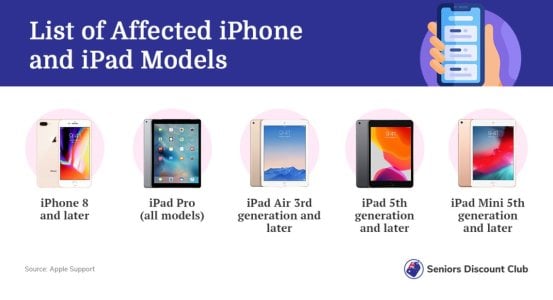Your iPhone and iPad may be at risk! Apple issues urgent warning over 'malicious' hack
By
VanessaC
- Replies 11
Apple has released an urgent security update and urged users of the iPhone 8 and later, iPad Pro (all models), iPad Air 3rd generation and later, iPad 5th generation and later, and iPad Mini 5th generation and later to 'immediately update their devices'.
The urgent update follows a recent discovery by the University of Toronto’s Citizen Lab that revealed a system flaw that could be 'actively exploited' by hackers.
The software flaw was found to be used to deliver commercial spyware called Pegasus, developed and sold by Israeli company NSO Group.
Apple cautioned that clicking on a 'maliciously crafted' image or attachment may result in 'arbitrary code execution', running on your device without your knowledge.
The tech giant is aware of the report, which suggests that the issue may have been actively exploited.
For users to install the update, Apple advises them to open 'Settings' on the iPhone or iPad and select 'General' followed by 'Software Update'.
The option to update should appear, and tapping on it will initiate the installation.
Below are the affected iPhone and iPad models:
You can read more about the update on Apple’s website.
General Cyber Security Tips and Best Practices
With ever-evolving technology, the threats posed by cybercriminals are becoming increasingly sophisticated and destructive. With this in mind, the following best practices can help keep you safe:
One of the key tenets of online security is maintaining strong, unique passwords for each of your online accounts. It might seem overwhelming, especially when considering the sheer number of password-protected sites and services we use on a daily basis. Consider using password managers to mitigate the inconvenience of memorising multiple complex passwords. They store your passwords securely and help generate strong, unique passwords and can automatically input them when you log in to various sites.
Operating system and application updates are crucial in protecting your devices from potential cyber threats. Cyber attackers often seek out outdated applications as these may have known vulnerabilities that are easy to exploit. Hence, it's wise to set your apps and software to auto-update, ensuring any security patches are applied as soon as they're released.
Avoid interacting with suspicious emails or links. Be sceptical of unsolicited emails, especially those that prompt you to click on a link or download an attachment. These could be phishing attempts that trick you into giving away sensitive information. Remember, if it looks too good to be true, it probably is.
Finally, make use of two-factor authentication wherever possible. This adds an extra layer of security by requiring more than just a password to access your accounts. This can be a code sent to your phone or a biometric feature like a fingerprint or facial recognition.
You may also refer to this article for more tips on how to protect yourself and your data from ruthless hackers.

Have you updated your software yet? Let us know in the comments below!
The urgent update follows a recent discovery by the University of Toronto’s Citizen Lab that revealed a system flaw that could be 'actively exploited' by hackers.
The software flaw was found to be used to deliver commercial spyware called Pegasus, developed and sold by Israeli company NSO Group.
Apple cautioned that clicking on a 'maliciously crafted' image or attachment may result in 'arbitrary code execution', running on your device without your knowledge.
The tech giant is aware of the report, which suggests that the issue may have been actively exploited.
For users to install the update, Apple advises them to open 'Settings' on the iPhone or iPad and select 'General' followed by 'Software Update'.
The option to update should appear, and tapping on it will initiate the installation.
Below are the affected iPhone and iPad models:
You can read more about the update on Apple’s website.
General Cyber Security Tips and Best Practices
With ever-evolving technology, the threats posed by cybercriminals are becoming increasingly sophisticated and destructive. With this in mind, the following best practices can help keep you safe:
One of the key tenets of online security is maintaining strong, unique passwords for each of your online accounts. It might seem overwhelming, especially when considering the sheer number of password-protected sites and services we use on a daily basis. Consider using password managers to mitigate the inconvenience of memorising multiple complex passwords. They store your passwords securely and help generate strong, unique passwords and can automatically input them when you log in to various sites.
Operating system and application updates are crucial in protecting your devices from potential cyber threats. Cyber attackers often seek out outdated applications as these may have known vulnerabilities that are easy to exploit. Hence, it's wise to set your apps and software to auto-update, ensuring any security patches are applied as soon as they're released.
Avoid interacting with suspicious emails or links. Be sceptical of unsolicited emails, especially those that prompt you to click on a link or download an attachment. These could be phishing attempts that trick you into giving away sensitive information. Remember, if it looks too good to be true, it probably is.
Finally, make use of two-factor authentication wherever possible. This adds an extra layer of security by requiring more than just a password to access your accounts. This can be a code sent to your phone or a biometric feature like a fingerprint or facial recognition.
You may also refer to this article for more tips on how to protect yourself and your data from ruthless hackers.
Key Takeaways
- Apple has released a security update for iPhones and iPads after discovering a system flaw may have been exploited by hackers.
- The flaw was discovered by researchers at the University of Toronto’s Citizen Lab, who believe it was used to deliver commercial spyware called Pegasus, developed by Israeli company NSO Group.
- Apple advised users that clicking on 'maliciously crafted' images or attachments may lead to arbitrary code execution, unbeknownst to them.
- To install the update, users should open 'Settings' on their device, select 'General', then 'Software Update', and then trigger the iOS 16.6.1 software update installation.
Last edited:









